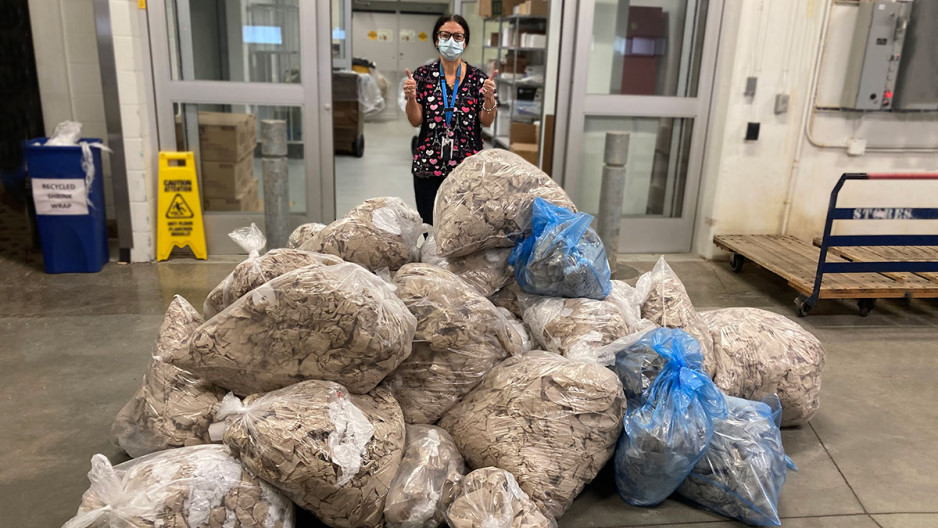Harnessing the power of paper towels
Paper towels are often thrown into the garbage after use, but where do they go, and what is the impact on the environment? This is a question Environmental Services (EVS) at St. Joseph’s Health Care London recently tackled and the team has now found a solution that is eliminating paper towels from landfills and fueling another source of renewable energy.
In April 2021, the EVS team began adding the recycling of paper towels in washrooms to their composting program. While paper towel is not recyclable, it can be composted. In a phased approach, bins are being placed in washrooms across the organization to collect discarded paper towels. They are picked up by Kevron Recycling, one of St. Joseph’s environmental partners, for composting and converting into renewable energy at local facilities, says Thomas Mercer, Director of Environmental Services.
Between April 2021 and March 2022, the paper towel composting efforts have diverted an impressive 469.5 kilograms of paper towel from landfill.
The daycare centre at Parkwood Institute is among the locations now collecting paper towels. Children wash their hands and toss the paper towel into collection bins, with the added hope that a future generation will be aware and knowledgeable about the impacts of waste on the environment.
In addition to paper towels, St. Joseph’s has a robust and efficient organics recycling program, which includes unavoidable waste such as food scraps and vegetable peelings. Composting bins are placed in kitchens across St. Joseph’s where organic waste is collected.
“With Kevron’s services, Food and Nutrition Services (FNS) staff do not have to separate packaging waste from food waste,” explains Thomas. “Almost all waste items from returned food trays can be put into the organics bin. Kevron separates the organic items from the packaging items and both are recycled.”
Food waste often winds up in landfills, where it rots and releases large quantities of methane, a potent greenhouse gas that contributes to global warming.
“Previously, St. Joseph’s organics recycling program accepted only food items,” adds Thomas. “The partnership with Kevron has significantly simplified tray cleaning and separation of food and other items for FNS, increased the amount of recycling and reduced the amount of waste going to the landfill site."
In 2021, a remarkable 877,506.6 kilograms was diverted through various environmental programs at St. Joseph’s.
“The team effort and enthusiasm of staff and our partners in making such a positive difference for the environment has been outstanding,” says Thomas. “St. Joseph’s believes that a healthy and sustainable environment is a necessary foundation for human health. Our values of respect, excellence and compassion encompass caring for our planet to ensure a better and healthier environment for patients, residents, staff and our community.
Did you know?
- In 2021, various environmental programs across St. Joseph’s diverted 877,506.6 kilograms from landfill sites
- In 2021, St. Joseph’s diverted 144,886.9 kilograms of organics to produce enough renewable energy to power nine homes for an entire year. Organics rotting in landfills produce methane gas, which is 25 times more harmful to the environment than carbon dioxide.
- In 2018, 3001 lamps from Mount Hope Centre for Long Term Care were recycled totaling 322 kilograms of glass, 11.3 kilograms of metal, 4.5 kilograms of phosphor, 5.9 kilograms of porcelain and 80.33 kilograms of plastic.
